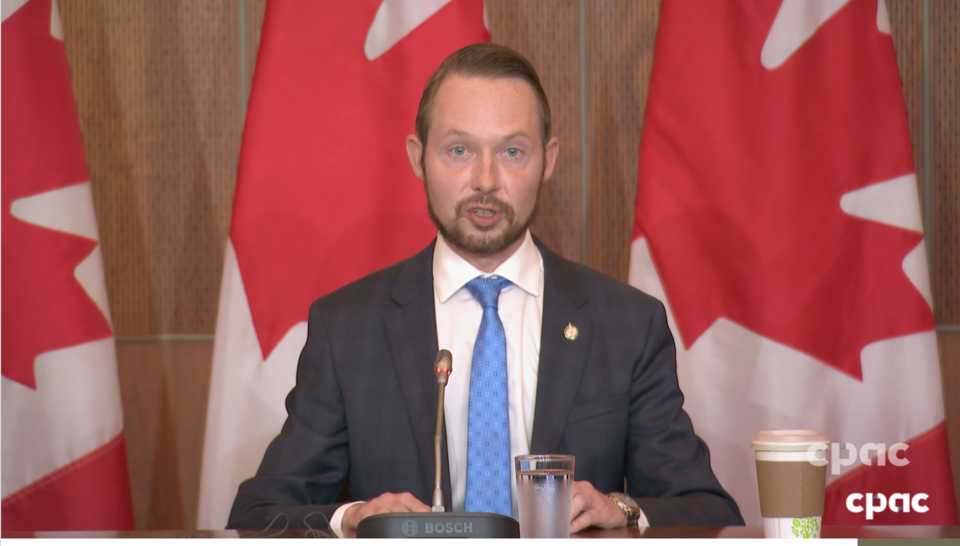An interim report on medical assistance in dying is problematic, says Conservative St. Albert-Edmonton MP Michael Cooper, who is also a member of the special joint committee on MAiD.
“What the committee has done in its main interim report has endorsed the Liberal government's radical expansion of MAiD in cases of sole mental illness,” said Cooper.
During a June 22 press conference, Cooper along with fellow Conservative MPs Michael Barrett for Leeds-Grenville-Thousand Islands and Rideau Lakes and Dominique Vien for Bellechasse-Les Etchemins-Lévis announced an interim dissenting report on the question of expanding MAiD where a mental disorder is the sole underlying condition, asking the federal government to pause expansion.
Cooper called the interim report on MAID problematic, stating the review had been rushed and the evidence raises serious doubt about the expansion of MAID to include mental illness as a sole identifying factor that can be done safely.
Cooper said under the law, to qualify for MAiD, a person must suffer from a grievous and irremediable condition.
“A grievous and irremediable condition is defined as an incurable condition in which one is in an irreversible state of decline,” said Cooper.
Cooper said the committee has heard from multiple witnesses that it is not possible to prove or predict whether a person suffering from a mental-health condition can get better. He is concerned that people suffering from mental-health issues will prematurely end their lives.
“Persons who might have years, if not decades, to live a healthy and fulfilling life in the face of bad evidence in the face of that uncertainty — it is completely unacceptable,” he said.
Cooper said it is dangerous to rush the expansion.
The special joint committee was created to review the provisions of the Criminal Code with regards to MAiD and its application as outlined in Bill C-7, which received royal assent on March 17, 2021.
The bill states the justice minister and the health minister must trigger an independent review to be carried out by experts respecting recommended protocols, guidance, and safeguards to apply to requests made for medical assistance in dying by persons who have a mental illness.
After March 17, 2023, people with mental illness as the sole underlying condition will be eligible for MAiD if they meet all the requirements and practitioners fulfill the safeguards which have been created.
A federal government website states that eligibility is assessed on an individual basis and considers all of the relevant circumstances.
Barrett quoted expert panelists on the difficulties of predicting the arc of mental illness, including Dr. John Mayer.
“Dr. John Mayer, a clinical psychiatrist, and medical ethicist said, ‘Psychiatrists don't know and can't know who will get better and live decades of good life. Brain diseases are not liver diseases,’” he said.
Barrett said Dr. Bryan Mushara, a clinical psychiatrist and professor at the University of Quebec, said the latest Cochrane review of research on the ability to find some indicator of the future course of a mental illness, either treated or untreated, concluded that we have no specific scientific ways of doing this.
"We are relying on the clinical hunch of someone who hasn't known the person for 20 or 30 years, and who has no scientific data showing that they can determine this," said Barrett.
Vien said they are asking the federal government for more time to study the issue.
“Rushing is not a good advisor. I think we need to take the time to look at all aspects of this issue of medical assistance in dying and to look at all the different angles with respect to mental-health disorders,” she said.



